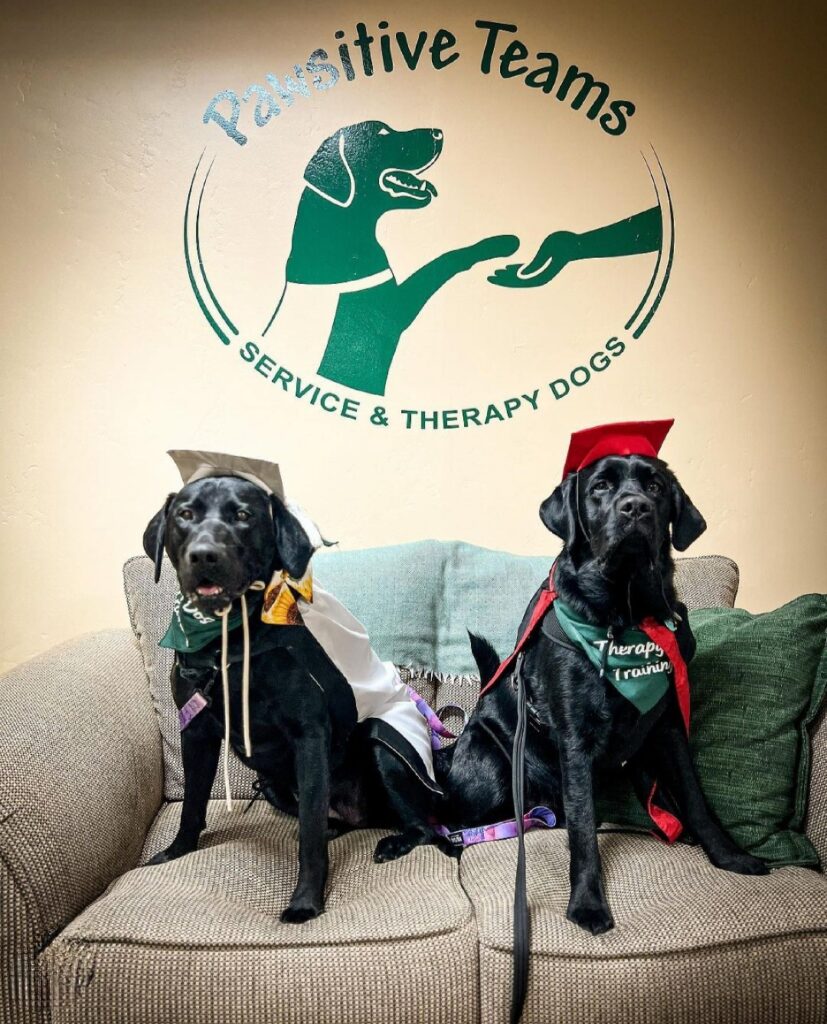An interview with Pawsitive Teams From San Diego, California.

Table Of Content
- Introducing Pawsitive Teams
- How Did Pawsitive Teams Started? What Are The Challenges Encountered Along The Way?
- What is the process of training service dogs and matching them with those in need?
- Can you share any heartwarming stories of how your service dogs have made a positive impact on someone’s life?
- What Kind Of Support Does Save The Animals Foundation Need From The Community, And How Can People Get Involved And Support Your Mission?
- Tell Us About The Scale Of Your Operation
- How do you ensure that the service dogs you place are well-suited for the specific needs of the individuals and veterans you serve?
- Tell Us About Any Challenges You Have Faced In Your Work And How You Have Overcome Them
- Are There Any Partnerships Or Collaborations That You Have Formed With Other Organizations Or Agencies In The Community?
- What Are Your Future Plans And Goals For Save Pawsitive Teams, And How Can The Community Help Support These Initiatives?
- Connect With Pawsitive Teams:
Introducing Pawsitive Teams
Pawsitive Teams is a nonprofit 501c3 organization founded some 25 years ago by two San Diego women (and one dog!). Our mission is to enhance the lives of individuals with special needs in San Diego County by using the skills of highly trained service and therapy dogs. Pawsitive Teams carries out its mission with very few staff and over 65 talented and compassionate volunteers working in our Service, Facility and Therapy Dog programs and in our Education and Outreach program. We are supported by the generosity and kindness of individual donors and small companies, and through grants.
I am Eileen Heveron, the Executive Director of Pawsitive Teams. I joined the organization around 15 years ago as a volunteer instructor in our Therapy Dog Prep School. Starting back in the mid-1990s, I eventually logged 23 years as a certified therapy dog volunteer with my husband’s and my pet dogs in Virginia, Missouri, and California and truly enjoy instructing individuals in San Diego who want to learn the ins and outs of sharing your dog with others. I have been the Executive Director of Pawsitive Teams since 2020, after having been mentored by our former Executive Director, Art Brauner, for the entire year of 2019.
How Did Pawsitive Teams Started? What Are The Challenges Encountered Along The Way?
The co-founders of our organization, Carol Davis and Charli King, loved dogs. Both were engaged as administrators in the human services field and were advocates for those with disabilities to be able to live independently. As well, they volunteered as puppy raisers for a large national service dog organization. They always felt bad that they couldn’t follow the pups they raised after turning them over to the service dog trainers. One thing led to another, and they developed the very local model that we still use to this day at Pawsitive Teams. In addition, the organization always provided very unique goal-directed therapy dog programs across the county. One such program began eight years ago, when the co-founders were approached by the recreational therapy department at what was then Balboa Naval Hospital about working with them on a program utilizing the skills of our therapy dogs to assist their clients. And thus, the highly successful Canine Inspired Community Reintegration (CICR) program which has worked with both active-duty military and veterans was born. Through getting to know individuals in this program, we learned much about their needs and we are now accredited to place dogs not only with mobility limited San Diegans, but also with military veterans with PTSD in San Diego.

What is the process of training service dogs and matching them with those in need?
Once Pawsitive Teams has identified a sponsor, a trainer and a litter of pups that are promising, testing is run on the litter and eventually a pup is identified to purchase. Once in our hands, the volunteer trainer takes the pup into their home at the age of 10 to 12 weeks. Training begins immediately at home, work, in the community and at our Training Center. Training takes up to two years to master obedience as well as the skills required to assist a disabled individual. The dog is tested throughout this process and if it is deemed appropriate to place the dog with a disabled person, pre-applications are solicited for matching. The matching process involves the pre-application, a formal application, interviews via phone or zoom, then in person, including with the family. Home and work (if appropriate) visits occur as well. Once a potential match is identified, transition training occurs and lasts approximately three months. The potential match, the dog, and the trainer all work together during this time. If that is successful, a probationary match period occurs until final ownership occurs.
Recently, Pawsitive Teams service dog Bobby was placed with US Navy Veteran Sondra who spent 10 years as an active-duty sailor. During her first duty station, she experienced a military sexual trauma incident from which she never had time to heal. At her next station, she had the opportunity to care for a dog named Sade, who she was lucky to have throughout her career and several years thereafter. Sondra was honorably discharged based on the PTSD and other diagnoses she experienced during her tenure. She noted that the emotional support she received from her pet dog Sade helped her cope with stress and provided stability. When Sade passed away, Sondra was left again to cope with social anxiety, PTSD, depression, and as a survivor of domestic violence. Someone advised her to consider a fully trained service dog to help her regain confidence and quality of life, and she found Pawsitive Teams. Sondra’s journey has been a long one and she has been proactive in seeking assistance. Her service dog, Bobby, has been by her side throughout the journey to recovery and helps her find the courage and strength to function more effectively and independently. She inspires, gives hope, and offers an ear to both veterans and active-duty service members as someone who has been down that path herself and found hope once again.
What Kind Of Support Does Save The Animals Foundation Need From The Community, And How Can People Get Involved And Support Your Mission?
Pawsitive Teams is funded through the generosity of our loyal donors, service organizations, and small foundations. We take donations in many ways and can always use the community’s monetary support. We would love to have individuals be ambassadors for us and let their friends and families know about us. We carry out our mission through our volunteers and can always use a wide variety of skills. Most people ask about dog work! Training a service dog takes a true commitment, some dog training savvy, and lots of patience, but we provide training to humans too! This activity is great for empty nesters or recent retirees, for example, since they often have the time and energy to engage in this type of work. The same is true for dog or puppy sitter volunteers, who help us when a trainer takes a vacation. How to become involved in our therapy dog programs is fully outlined on our website (as are the requirements for dog trainers). Our volunteer application is found at the top of our website under the Apply tab.

Tell Us About The Scale Of Your Operation
Our dogs can be thought of as serving one-to-one (a service dog serves one person), one-to-many (one facility dog serves many people at one facility), and many-to-many (many therapy dogs serve many people at many places). Over the last 25 years, we have trained and placed 72 Service Dogs. The national placement rates for placement are around 50% and we are just about 70%. We’ve placed trained and placed 11 Facility Dogs. And over 850 individuals have completed our Therapy Dog Prep School and have gone on to become therapy dog volunteers across the county. Our own unique goal-directed therapy dog programs are offered at eleven sites across the county. Prior to the COVID pandemic, it was estimated that our organization touched some 3,400 citizens annually.
How do you ensure that the service dogs you place are well-suited for the specific needs of the individuals and veterans you serve?
As noted above, we provide dogs only for two types of disabilities, mobility limitations and military PTSD, and as such have an in-depth understanding of the requirements for the specific needs of these two populations. We test the pups from the time they are born, through selection, several times during the training process, at the time of placement, several times during transition training, and every two years for the life of the dog. The service dog training teams meet weekly for training at our Training Center and monthly for a roundtable discussion, and all dogs in training work are assessed informally each week.
Tell Us About Any Challenges You Have Faced In Your Work And How You Have Overcome Them
Two months after I became Executive Director, the COVID pandemic hit. It was a challenge to carry on, but our team kept us going by making the best possible use of technology in order to serve our community. Service and Facility Dog command demos were put online, our meetings were held via Zoom, and we even did some of our Outreach and Education offerings on Zoom as well. Because of the social distancing and other lockdown requirements, our Therapy Dog program partners stopped all activities and due to dogs ageing out and volunteers being called on to take care of family members, we lost many of our volunteers. We are still building our numbers back up. Finally, due to the pandemic and more recent worldwide economic challenges, our donations were lower than expected. We have been blessed with assistance from unexpected places and are overcoming this challenge.

Are There Any Partnerships Or Collaborations That You Have Formed With Other Organizations Or Agencies In The Community?
We are accredited by Assistance Dogs International and have collaborated with several of our fellow service and facility dog organizations. In addition, our Therapy Dog programs are highly specialized and currently there are eleven organizations with whom we partner to offer the magic of dogs to the underserved in our community. Finally, a local real estate office (KONA Realty) founded by a Navy veteran who strongly believes in our mission has recently established a relationship with us that we look forward to growing over time.
What Are Your Future Plans And Goals For Save Pawsitive Teams, And How Can The Community Help Support These Initiatives?
Pawsitive Teams would like to grow! That said, it is difficult to do so in this day and age. Our trainers are all volunteers and that is a huge commitment since the time it takes to fully train and place a service dog is over two years. We are therefore beginning to implement changes throughout our three dog programs to allow us to meet the great (and growing!) need for service, facility, and therapy dogs in San Diego County. One exciting change is our 2023 goal to expand our Facility Dog program so we can assist more organizations. We have developed and launched a new program option within our Facility Dog area and are excited to see if grows. In the Service Dog area, we have a 2023 goal to launch a Veterans Resource offering this year to make applying for a service dog less confusing, no matter the organization they choose. The community at large can help us grow these and other new offerings by providing funding to support our efforts.
Connect With Pawsitive Teams:
Location: 7031 Carroll Road, San Diego, CA 92121
Contact number: (858) 558-7297
Contact email: [email protected]
Website: https://pawsteams.org
Instagram: pawsteams




















